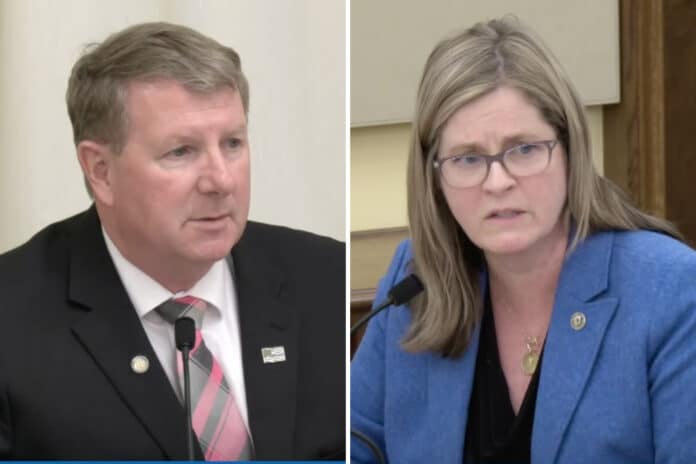A public safety package offered by Republicans in the Minnesota House of Representatives was advanced out of the House Public Safety Committee on Tuesday in a voice vote.
Last month, Republicans unveiled one of their priority legislative measures which rolls a series of public safety proposals into one bill. Following an extended delay to the start of House business, the GOP’s plan to “Make Minnesota Safe” was officially introduced and is referred to as HF 7.
Among their proposals, the GOP wants to establish 10-year mandatory minimum sentences for those convicted of first-degree sex trafficking, allow police to attach tracking devices to cars reported stolen by the owner at any time, require individuals to register as predatory offenders if they receive stayed sentences in sex offense cases, and establish new criminal offenses for blocking highways and freeways.
The “Make Minnesota Safe” plan would also increase criminal penalties for those who flee from a police officer in a reckless manner, assault a police officer, or conspire to damage critical infrastructure. Additionally, the GOP’s plan would establish a searchable database for the public to access more information on charging and dismissal decisions.
On Tuesday, the House Public Safety Committee heard the bill for the first time. Rep. Paul Novotny, R-Elk River, is the author of HF 7 and also serves as the chair of the Public Safety committee.
At the committee hearing, a representative from the Ramsey County Sheriff’s Office told legislators that the bill would improve law enforcement’s ability to investigate and thwart vehicle theft crimes. Additionally, individuals representing the Minnesota Police and Peace Officers Association, the Minnesota Sheriff’s Association, and the Minnesota Chiefs of Police Association urged legislators to support the bill.
Conversely, a representative from the Minnesota Justice Research Center told legislators that the increased sentences in the bill would do little to prevent crime. Two private citizens testified against HF 7, expressing opposition to the provisions regarding vehicle tracking and interfering with critical infrastructure.
Opposing the bill, Democrats expressed concerns that portions of the bill duplicated current law and that fiscal costs associated with the bill are not yet known. However, a fiscal note, which shows the financial costs of the proposed law, is forthcoming and will be looked at by the committee.
Furthermore, Democrats were concerned the provision on vehicle tracking would infringe on the constitutional prohibition on warrantless searches and seizures.
Arguing against the bill, Rep. Kelly Moller, DFL-Shoreview, said that crime is decreasing and the bill is based on “incorrect assumptions and incorrect data.” Further, Moller said criminal penalties have increased in recent years, penalties for assaults on law enforcement were recently increased by the DFL, and public safety requires a more comprehensive approach than simply increasing penalties.
Moller, the lead Democrat on the committee, argued that the DFL’s approach to issues of public safety has worked. She recommended a “no” vote on HF 7.
Democrat MN Rep. Brion Curran: 'If we're talking about criminal consequences as a way of deterring crime … I would just point out perhaps criminal consequences for people who stole land and put pipelines through it, maybe we should have had consequences for that.' pic.twitter.com/vPUf8B2anK
— Anthony Gockowski (@AntGockowski) February 12, 2025
Responding to the criticisms of his bill, Novotny said the provisions in his bill are proposed changes to state law that make sense and were brought to him by victims, advocates, and law enforcement. In particular, Novotny said the bill’s provision allowing for police to place a tracking device on a fleeing vehicle was a “no-brainer.”
The committee subsequently voted to advance HF 7 in a voice vote. Republicans currently have 10 voting members on the committee and Democrats have nine voting members. As a result of the affirmative vote, the bill will be sent to the House Judiciary Finance and Civil Law Committee for further discussion and debate.










